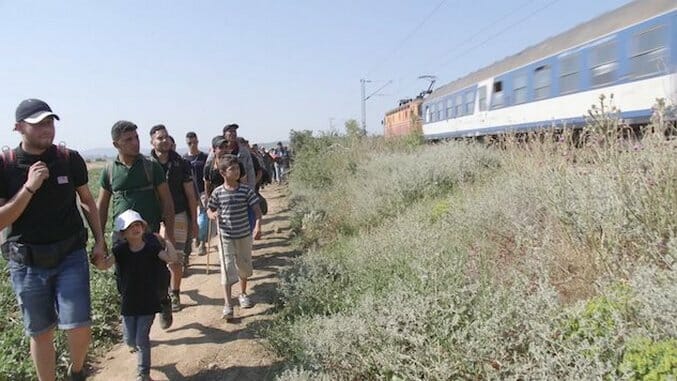You Can Handle the Truth: On Field of Vision’s Imperative Episodic Journalism
Images courtesy of Field of Vision
Since its founding by Laura Poitras, AJ Schnack and Charlotte Cook in September 2015, Field of Vision—a “visual journalism film unit” with an entirely free-to-watch digital archive—has emerged as one of the foremost producers and distributors of documentary reportage in the country.
Consider its offerings, each perfect in their modernity: showcases of original short-form work by new master directors like Kirsten Johnson, Adrian Chen, and Dustin Guy Defa; encrypted and secure submission options for sensitive or classified AV material; and, recently, acclaimed nonfiction features like Yance Ford’s Sundance premiere Strong Island and Poitras’s disturbingly brilliant Julian Assange exposé Risk.
At this infant stage, however, the works that most powerfully affirm the site’s high standard are its binge-able, episodic docuseries. By serializing the work of independent journalists, FoV’s in-depth reportage builds on its catalogue of short films—which focus primarily on the nuances of a single political concern or figure, like Johnson’s military surveillance indictment The Above (2015)— by using their length to explore a macrocosmic range of international conflicts and political situations, from xenophobia in Holland to the economic crisis in Greece to war-torn Syria.
With the battle for a free press increasingly fraught, the mere fact that the outlet produces, promotes and releases episodic televisual journalism pro bono is almost heroic in the context of most broadcast and cable news coverage. Still, cautious, thoughtful consumption is advised: If a common CNN segment is a milk-chocolate Hershey’s bar, a Field of Vision episode is a bitter dark chocolate truffle.
FoV launched its first docuseries, #ThisIsACoup, in December 2015. Directed by photojournalist Theopi Skarlatos, narrated by producer Paul Mason and released in single segments over the course of four days, it incorporates a combination of extraordinary interviews and archival footage to depict the European Union’s destruction of “the first radical left government in modern history”: Greece’s SYRIZA party.
Watching the series now, nearly two years after its release, Skarlatos’s expansive structural talent remains almost as impressive as the production’s access. Through early 2015, she and Mason secured interviews with the leaders of SYRIZA—including Prime Minister Alexis Tsipras and former Minister of Finance Yanis Varoufakis—in the midst of desperate loan negotiations with the E.U. These exclusive conversations are visually panicked, urgent and hellish, presenting a nation on the brink of imposed austerity, yet the idealization of Greece’s ferocious independence becomes the filmmakers’ primary theme.
Editor Andreas Loukakos helps to turn their political concerns passionately personal, alternating between dialogues with bureaucrats to hostile rioting that Mason describes as “an epic clash” akin to the Arab Spring. Meanwhile, Skarlatos speaks to a coterie of locals who widely share both the “right to say no to austerity” and the inclination. (One protestor, blaming Germany’s chancellor, Angela Merkel, for Greece’s financial stranglehold, gives the first episode its title: “Angela, Suck Our Balls.”)
In 2017, the sight of centuries-old democratic freedoms being impinged upon feels sickeningly familiar, primarily because Loukakos opts for a cyclical, Sisyphean chronology of push-pull bargaining. Foreign governments threaten virtual control over Greek lawmaking in exchange for desperately needed credit, while negotiations stall for months at a time. These monolithic superpowers loom in news footage like the spaceships in Arrival, days away from indenturing the country’s citizenry.
This kind of dystopian prescience is unusual for nonfiction series, especially one focused on a particular national crisis, but #ThisIsACoup welcomes reconsideration in the immediate present. Though Skarlatos and Mason set out to depict an isolated circumstance, the episodes increasingly move towards frighteningly accurate predictions of collapse (note the photographic resemblances between Greece’s anti-austerity assemblies and recent images of The Women’s March). For those of us in constitutionally challenged democracies, Field of Vision’s inaugural series remains unceasingly relevant in ways that television news may never be.
-

-

-

-

-

-

-

-

-

-

-

-

-

-

-

-

-

-

-

-

-

-

-

-

-

-

-

-

-

-

-

-

-

-

-

-

-

-

-

-








































